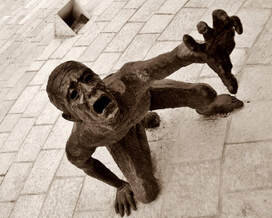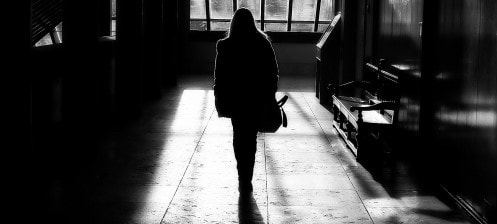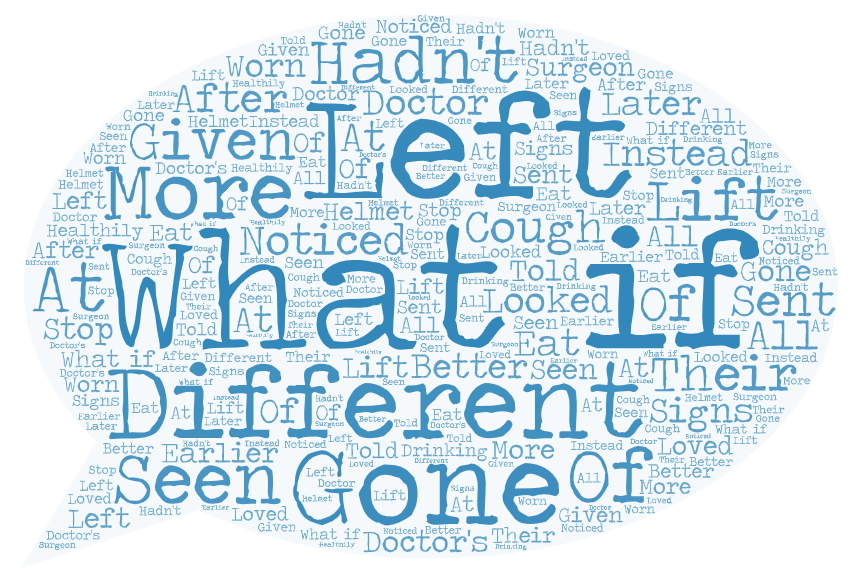|
When I stepped out of the door the morning that Tim died, I couldn’t believe that village life could go on as normal when my life had so suddenly and drastically changed. But it did.
Over the years since 2018, I have rebuilt my life, embracing my sexuality, going back to university, meeting and marrying my wonderful Dee, and making a fresh start in a new location. All of these changes have left me sometimes feeling that I'm living two parallel lives. There's the life that I live now and the other that carried on, where I am still married to Tim. We still live above the bookshop. And he is pricing books downstairs. The life we live without them can leave us feeling guilty and resentful. About the what-ifs, the things we did or didn’t say, simply that we survived. And for going on without them. Going to work. Seeing friends and family. Making changes to the house. Enjoying ourselves. Doing things that they will never do, in places that they will never see, and making decisions that they will never know. There’s nothing I can say that makes this better. As Tim would say, it is what it is. We continue without them, moving forward but not moving on. And as a community, we do it together.
0 Comments
Survivor guilt is the guilt that people feel when they are the one left behind after a death. It could be for surviving the accident that killed them. It could be what you felt you should or shouldn't have done before their death. Or it could simply be that they were ill and you were not. Around 90% of people who survive a traumatic event experience survivor guilt.
The kinds of symptoms of survivor guilt overlap with those seen with post-traumatic stress disorder (PTSD), and survivor's guilt has been defined as a symptom of PTSD.
People who have been through trauma before, who live with mental health, addiction or psychiatric issues, or who lack self-esteem, are introverted or are submissive by nature may be more likely to experience survivor guilt. Survivor guilt generally starts to fade over time. There are a few hints and tips that might help you cope with the feelings:
If your survivor guilt symptoms become overwhelming and mean that you can't function properly, consider talking to a psychotherapist or counsellor. There are so many 'what ifs' after we lose someone
I've looked back over some old posts of mine on the Widowed and Young Facebook forums (WOC is short for the Widowed and Young Without Children group). I have managed to avoid the what ifs so far. Coming up to 14 weeks, they are fighting their way in. He was tired and sometimes out of breath but he was doing a lot of lifting and carrying - what if that was early signs of heart failure and not just him overdoing it. What if the rough night on that last night wasn't just one of his frequent stomach bugs and was the early signs of his heart stopping. What if... 23 May 2018 -14 weeks after his death Having a bit of a wobbly week. Struggling with an upsurge in the guilt and what ifs about Tim's death - what if I had noticed he was more tired, what if I had insisted that we got more help moving books from one storage to another. Nov 2018 – nine months after his death Can I have a WOC hug, please? Doing a lot of clearing out at the moment. Been shredding paperwork and this morning it was Tim's medical paperwork from some years back. He had hyperlipidaemia and type II diabetes and had an angiogram some years ago. It's brought back the few months before he died, when he was starting to get tired. At the time I though he was just working too hard (we were moving books from one storage unit to another) but now I see that it was the beginning of his heart failure. I am hypersensitive at the moment as I am just a few weeks away from his second anniversary, but I am having major attacks of 'what if...' Feb 2020 – two years after his death My mental and health physical health weren't good in the few months before Tim died. What if that was the reason he didn't tell me he felt ill, or the reason I missed it? Or what if being ill meant that I made his last few months unhappy?
Coping with the what ifs I believe that we get these feelings because our brain is trying to explain things, and attempting to deal with our feelings of helplessness. A fellow WOC said to me "what ifs are like demons on the shoulders of our grief, whispering in our ears at times when we are most vulnerable". What comforts me is that Tim and I loved each other, and that he died at my side. When we get what ifs, it's important to remember that hindsight is 20/20, and what-ifs are generally completely unrealistic. It's like looking at a puzzle – when you first glance at it, it seems unfathomable, but once you have the answers it seems so obvious. When you get caught in what ifs and if onlys:
 Tim died suddenly in the early hours of the morning. His heart just stopped. He had type 2 diabetes that he perhaps didn't manage as well as he should, and he had been feeling tired. But he was a bookseller, and we were in the process of moving his enormous stock of books from one storage unit to another. I asked him if he was having chest pain, and he said no. So, I brushed it off as simple weariness. A banana box of books weighs a lot, after all. After he died, and the post-mortem revealed heart failure related to type 2 diabetes, I was wracked with guilt. What could I have done? Monitored his diet more closely? Watched him take his tablets three times a day? Insisted he went onto insulin? Got the truth out of him about how he was actually feeling? If he'd died in an accident, I suspect I would have felt guilty for not giving him a lift that day, or persuading him to get the bus, or agreeing that he should cycle. That's one kind of guilt after someone dies. There's also the guilt of feeling that you didn't say what you should have, or said what you shouldn't have. Did I tell him I loved him the night before? Did we work too much and not spend enough time together? What if our last night out had been a terrible one (rather than the wonderful evening it was), or if I'd persuaded him that we shouldn't go? How would I feel if we'd had an argument? This kind of guilt may become more complicated if you had a difficult relationship with the person who died. As survivors, we can often feel guilty that we are alive, and our partner is dead. This is particularly intense for people surviving an incident where their partner died. Survivor guilt can also be a symptom of post-traumatic stress disorder (PTSD) – talk to your doctor or a psychotherapist if you think you might have PTSD. In grief, I became full of 'I should have…' 'I could have…' 'I would have…' But feeling guilty doesn't mean that we are guilty – it's us trying to put order into the chaos that grief is. If we can blame someone, especially ourselves, we can think we get back control. What can we do?
|
AuthorI was widowed at 50 when Tim, who I expected would be my happy-ever-after following a marriage break-up, died suddenly from heart failure linked to his type 2 diabetes. Though we'd known each other since our early 20s, we'd been married less than ten years. Archives
July 2024
Categories
All
|





 RSS Feed
RSS Feed